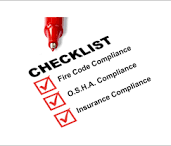
Laws are made for a reason. In the case of fire codes, that reason is safety. The purpose is to protect you from becoming trapped in a dangerous situation. Because of this practicality, common sense tells us that it's important to follow these rules. But there are also some legal consequences that come with not following the fire code. Educate yourself on what could happen if your building fails to meet legal standards for fire safety. Keep in mind that fire codes differ among the 11 states that we serve, but that the punishments all share these common threads.
Penalty fines range from $100 to $2500, depending on the severity of the offense and willingness to correct it. Noncompliant businesses are given a 30-day grace period to fix anything not up to par.
Similarly to Maine, residents in New Hampshire are given a "reasonable time... to make necessary altercations" if a fire code law is broken, then they are fined.
In Vermont, businesses are required to have certified fire safety certificates which are renewed every three years. If inspection fails, you must pay again until you pass the inspection.
Though first-time offenses are treated with a standard fine, repeat offenders are eligible to receive a fine of at least $1,000 and/or a jail time of at least one year.
Businesses in this state must be re-evaluated each year, with pricey examinations that must be re-done if failed.
To be fined in Rhode Island, businesses must go to court against the Fire Safety Code Board of Appeal and Review. If the case is lost, punishments are enacted on a case-by-case basis.
For noncriminal offenses, citizens have fourteen days to pay requested fines (which are determined depending on the severity of the offense). Any attempt to protest these fines is met with a misdemeanor charge.
Fines in Pennsylvania cover a broad spectrum of amounts, with case-by-case discretion. They are effective after just one offense.
During inspection in New Jersey, the inspector must fill out a sheet of violations which are met with individual punishments.
The Office of the State Fire Marshall is charged with doing spontaneous "spot checks" of buildings, after which the officer may indict fines of his/her own discretion.
Local governments are tasked with enforcing the State of Virginia Fire Prevention Code. Each county has different regulations about fines and other punishments.
Now that you know what the consequences are, you have even more motivation to follow your states fire code. Not only is it important for health and safety, but also good legal and economic standing. Here at Lighting Services, Inc., we pride ourselves on our dependable emergency lighting services. Instead of being caught red-handed with a costly fire code violation, contact us to keep your business safe and legal.


